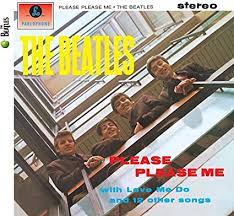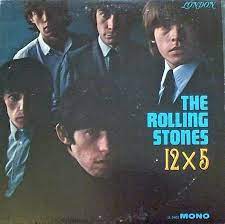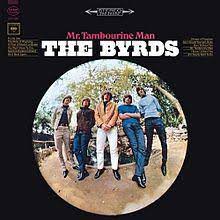Tutorial Pricing: $3.25ea OR any 10 for $10
(use code "Any10410" at checkout)
Paid Requests for $25ea
(comes with any 8 freebies -> so 9 for $25)
100's Of Free Demos & Chord Sheets
Popular Bands In The 60s
On The Acoustic
Welcome to my popular bands in the 60s acoustic section. This section has a combination of bands that are well known from that decade.
Help yourself to the free chord sheets and check out my demos below. If you need the full instructional tutorial, it's available for a small fee, or purchase 10 from the site in a bulk order and save. See prices listed above.

More Popular Songs In The 60s
Jay And The Americans - She Cried
Pickettywitch - Baby I Won't Let You Down
The Left Banke - Walk Away Renee
The Lettermen - The Way You Look Tonight
The Love Affair - A Day Without Love
The Mamas & The Papas - California Dreaming, Creeque Alley, Monday Monday
The Marbles - The Walls Fell Down
The Marmalade - Reflections Of My Life
The Merry Go Round - Live
The Myddle Class - Free As The Wind
The Outsiders - Time Won't Let Me
The Raspberries - Go All The Way, Lets Pretend, Should I Wait
The Righteous Brothers - Unchained Melody, You've Lost That Lovin Feeling
The Ronettes - Be My Baby
The Rooftop Singers - Walk Right In
The Searchers - Love Potion #9, Needles And Pins, What Have They Done To The Rain, When You Walk In The Room
The Steam Machine - Let The Feeling Begin
The Tokens - The Lion Sleeps Tonight
The Turtles - Happy Together, You Baby
The Vogues - You're The One
The Walker Brothers - The Sun Ain't Gonna Shine Anymore
The Wonders - That Thing You Do
The Yardbirds - For Your Love
The Youngbloods - The Wine Song
The Young Rascals - Good Lovin'
The Zombies - She's Not There, Tell Her No, Time Of The Season
We Five - You Were On My Mind
Zagar & Evans - In The Year 2525
Popular Bands In The 60s
Chords, Lyrics, Demos, Tutorials
Cupids Inspiration Songs
Yesterday Has Gone ... info soon.
Chord sheet and video lesson found in the zip file below.
Jump To Top
Jay And The American's Songs
She Cried ... info soon.
Chord sheet and video lesson found in the zip file below.
Jump To Top
Pickettywitch Songs
Baby I Won't Let You Down ... info soon.
Chord sheet and video lesson found in the zip file below.
Jump To Top
The Left Banke Songs
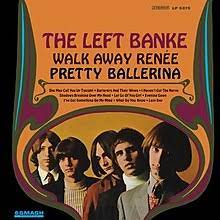
Walk Away Renee was a 1966 hit for The Left Banke, reaching #5 on the US and New Zealand and #3 in Canada.
The track is from the album of the same name.
For rhythm here play a down down up down up down up and repeat pattern in standard tuning. A bit of lead during the rhythm while playing the chords D, A/Db, B, A, E/Ab, G, D/Gb, Gbm, E, Bm, B7, Gbm/F, A6 and a Gbm6.
Jump To Top Of Popular Bands In The 60s
The Lettermen Songs
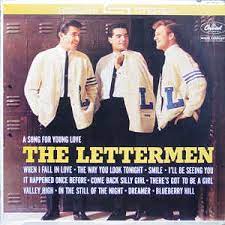
The Way You Look Tonight song dates back to 1936 when Fred Astaire sang the song in a film called Swing Time.
Up through the years other artists recorded the song including Phil Collins, Rod Stewart, Bing Crosby and in 1961, The Lettermen had a #13 in the US and a #36 in the UK with their version.
The chords here are Em, C, B7, Dbm, Gbm, E, G, Gb, F, D, Bm and Am, played in standard tuning and no lead work. For rhythm play a down down down up down down and repeat pattern with some down strokes in places.
Jump To Top
The Love Affair Songs
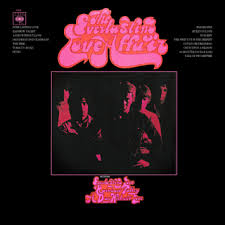
A Day Without Love was a hit single for The Love Affair, released in 1968. It appeared on their debut album, "The Everlasting Love Affair," which was also released that year.
The song performed well on the UK Singles Chart, peaking at number 6 and further solidifying the band's popularity following their number one hit "Everlasting Love." Written by Philip Goodhand-Tait, "A Day Without Love" showcased Steve Ellis's powerful vocals and the band's signature blend of pop and soul.
I play this one with a down down up down up down up rhythm pattern. There is some d-cending orchestration line in here which can be duplicated slightly on the acoustic. The chords you'll need here are G, D/Gb. F, E7, Am, Am/G, D, C/G, C and an Em.
Jump To Top Of Popular Bands In The 60s
The Mamas & The Papas Songs
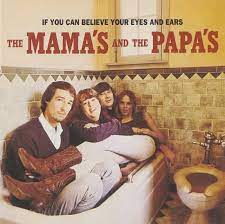
California Dreaming an iconic song released in 1965, has become synonymous with The Mamas and The Papas' signature sound. It was featured on their album "If You Can Believe Your Eyes and Ears," released the same year. T
he song achieved remarkable success on the music charts, reaching the 4th position on the Billboard Hot 100 in the United States and the 23rd position on the UK singles chart.
Over the
years, "California Dreamin'" has been covered by a multitude of artists
and bands, attesting to its timeless appeal. Notable covers include
renditions by Barry McGuire, Bobby Womack, José Feliciano, and even the
Beach Boys.
I play a capo 3rd fret on this number in standard tuning. Some lead required with the chords Am, Esus, G, F, E, C and an E7. For rhythm play a down down up down up down up rhythm pattern. You can throw in an upstroke also as you'll see me do in the demo.
Jump To Top
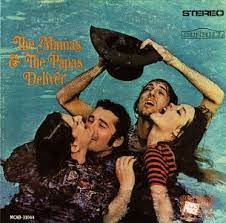
Creeque Alley released in 1967 as part of their album "Deliver," is a distinctive song in The Mamas and The Papas' repertoire. Unlike their chart-topping singles, "Creeque Alley" wasn't released as a single and didn't chart separately. However, it played a crucial role on their "Deliver" album, which reached No. 2 on the Billboard 200 chart, showcasing the album's commercial success.
Written by John Phillips and Michelle
Phillips, two integral members of the band, "Creeque Alley" is an
autobiographical narrative that offers a candid glimpse into the
formation and early experiences of The Mamas and The Papas.
This one is played in standard tuning with no lead and the chords B7, E, Gb and a D. For rhythm play a simple root down bass up down up and repeat pattern.
Jump To Top Of Popular Bands In The 60s
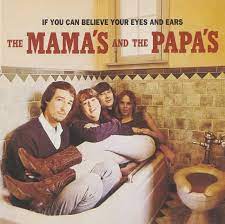
Monday Monday was released in 1966 and is one of The Mamas and The Papas' most iconic songs. It was featured on their album "If You Can Believe Your Eyes and Ears." The song achieved remarkable success on the music charts, making it a memorable part of their musical legacy.
In the United States, it soared to the top of the Billboard Hot 100, securing the No. 1 position, while also reaching No. 3 on the UK singles chart. Written by John Phillips, the song captures the universal feeling of the start of the workweek, making it relatable to audiences worldwide.
For rhythm here play a down
down up down down up down up and repeat pattern in standard tuning and
no lead. The chords here are G, C, F, A#, D7, Gadd11 and an A.
Jump To Top
The Marbles Songs
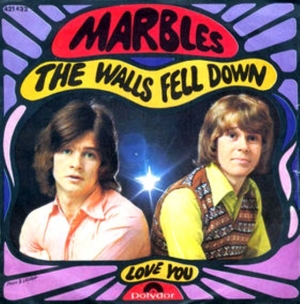
The Walls Fell Down
was written by The Bee Gees and recorded by The Marbles and released as
a single in 1969. The song was a top 10 in The Netherlands and Belgium.
Graham Bonnet sang lead on this one and takes it much higher then I do
here.
Play a down down up down up down up pattern but it will get somewhat interrupted as you make some quick chord changes. The song is in standard tuning and does a two fret key change near the end of the song. Chords you'll need here are D, G, A7, B7, E and an A.
Chords & Lyrics
Jump To Top Of Popular Bands In The 60s
The Marmalade Songs
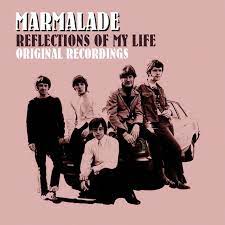
Reflections Of My Life was released in 1969 and was a huge top 10 hit in several countries worldwide. It never made it to #1 but got close in Ireland at #2.
The track hails from the album Reflections Of The Marmalade.
This one is played in standard tuning with some lead work required. The rhythm pattern is a down down up down down up down up and repeat will work throughout using the chords G, Bm, Em, G7, C, Am, D and a Dsus.
Jump To Top
The Merry Go Round Songs
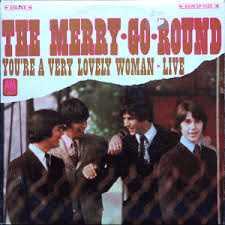
Live was a single release by The Merry Go Round back in 1967 and was their only charting song which only made it to #63 on the charts. This was also the only album released by this group as they disbanded shortly thereafter.
This one has a down down down up down up rhythm pattern with a few riffs and slides and is played with the chords E, D, A and G
Jump To Top
The Myddle Class Songs
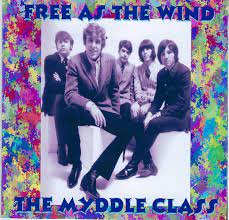
Free As The Wind was a single released by The Myddle Class in 1965. The song as far as I know never appeared on any album.
This one is played with a capo 3rd fret and played with mainly all down strokes. No lead here to worry about as you play through the chords C, A#, Am, F, Dm and a G.
Jump To Top
The Outsiders Songs
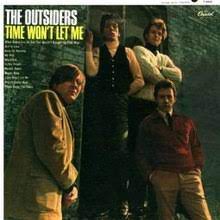
Time Won't Let Me is from 1966 by The Outsiders, a band based out of Cleveland Ohio.
They managed a #5 hit in the USA and Canada. This song is from the album of the same name.
Play this song in standard tuning with some lead required and the chords A, Gbm, G, E, Bm, Dbm and a D. For rhythm you can play a down down up down up down up and repeat as well as some steady up and down rhythm.
Jump To Top Of Popular Bands In The 60s
The Raspberries Songs
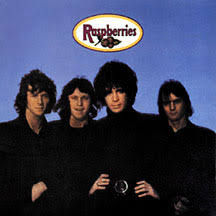
Go All The Way came out in 1972 on their first album, also called "Raspberries." It was their biggest hit, reaching number 5 on the US charts. The song is about wanting to be with someone and has a catchy vibe that many people loved.
Played with a capo 2nd fret for the original key the chords here are G, C, C/G, F, A#, Gm, Cm, Am, D7, Em, D, Bm, E7, D#, A, Em/D#, Em/D and a Em/C#. For rhythm play a down up pause up down up pause up pattern with a bit of lead in standard tuning.
Jump To Top
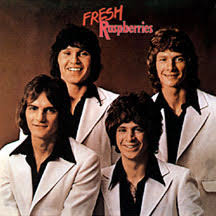
Let's Pretend was on their second album, "Fresh," released in 1972. This song didn't do as well on the charts, but it still reached number 35 in the US.
It's a softer love song that shows off the band's skill with melodies. The song helped make The Raspberries famous for their power pop sound, which mixed rock energy with pop catchiness. This song are still played on radio stations today and are remembered as classic examples of 1970s power pop music.
I play this one in standard tuning with a down down up down up down up rhythm pattern with a few down stroke chops here and there. No lead but for chords you'll need a G, C/G, Am7, D7, Bm, Em, D, C, F and a B7.
Jump To Top Of Popular Bands In The 60s
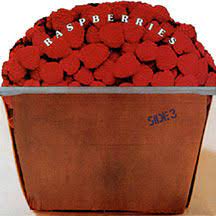
Should I Wait is actually not a 60s song but a 1973 song from the bands album "Side 3".
The song was never released as a single.
I play a drop D tuning for this one and a capo 2nd fret. Some lead work here with the chords G, C, D, D/Gb, Em, B7 and A7 while playing a root down up root up down up and repeat rhythm pattern.
Jump To Top
The Righteous Brothers Songs
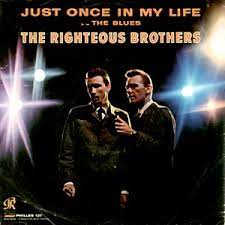
Unchained Melody was a song in a 1955 film of the same name. The Righteous Brothers recorded their version in 1965. Of course these two lads were not actually brothers at all. Bobby Hatfield won a coin toss with his duet partner Bill Medley and took the lead vocals on this song as both wanted to sing the lead.
Phil Spector put this "throw away" song on a B-side assuming it would not get played but the DJ's proved him wrong and the song went to #4. It can be found on the album "Just One In My life.
Standard
tuning here with the chords G, Em, C, D, Bm, G7, A# and Cm will get you
through this one with no lead work. Play a down down up down up down
down and repeat rhythm pattern.
Jump To Top Of Popular Bands In The 60s
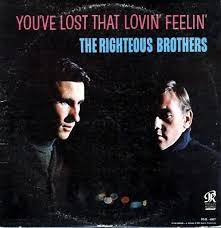
You've Lost That Lovin Feeling was a huge #1 hit in both the UK and the US when it was released in 1964.
The song can be found on the album of the same name.
Jump To Top
The Ronettes Songs
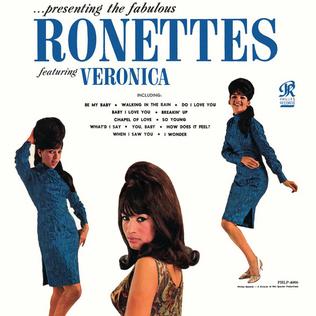
Be My Baby was one of five singles from the only album ever recorded by The Ronettes. Three of the five singles were top 10s and this track made it to #2 in the US and was a top 10 in several countries.
Jump To Top
The Rooftop Singers Songs
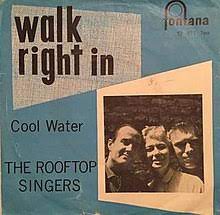
Walk Right In is an old blues tune from 1929 that was revived in 1963 by a group called Rooftop Singers who had a huge #1 in several countries with their re-make.
The song is on their album of the same name.
I like to play a drop D tuning in this one with a capo 1st fret and some lead. The chords here are G, E7, C, C7, A7 and a D7 with a root up down up rhythm pattern with some riffs all through the song
Jump To Top Of Popular Bands In The 60s
The Searchers Songs
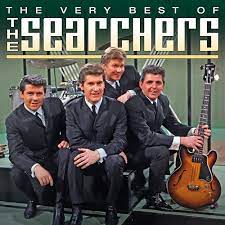
Love Potion No. 9 is a well known song by The Searchers, released in 1963. It was first written and recorded by others, but The Searchers' version became the most popular.
The song tells a funny story about a man who gets a love potion from a gypsy. After drinking it, he has some crazy love experiences. The Searchers' version has their special guitar sound and good singing together.
It was a big hit, reaching number three in both the UK and US charts. This helped make The Searchers more famous during the time when many British bands were becoming popular in America.
I play this song in standard tuning with the chords Am, Dm, C, E, and B with a few riffs blended into the rhythm. Play a root down up down up root up down up rhythm pattern here.
Jump To Top
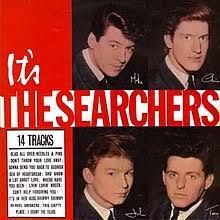
Needles And Pins is one of The Searchers' most famous songs, released in 1964. It was written by Sonny Bono and Jack Nitzsche, but The Searchers made it a hit.
The song did very well on music charts, reaching number one in the UK and number 13 in the US. It's about the pain of losing someone you love. The song's catchy tune and emotional lyrics made it popular with many people.
"Needles and Pins" is still loved today and has been performed by other musicians, including Tom Petty. It's an important part of The Searchers' history and shows how they helped shape 1960s music.
Played in standard tuning with a riff using the chords G, Em, C, D, A, B7, G, Gb, B and Abm. Use a root down root up down up and repeat rhythm pattern.
Jump To Top Of Popular Bands In The 60s

What Have They Done To The Rain was actually one of the first protest songs towards the environment when it was released back in 1964 by The Searchers. They have a #2 in Canada and a #13 in the UK and a #29 in the US.
This one is played with a root down up down up down up down up and repeat rhythm pattern in standard tuning and with no lead. The chords are E, Gbm, B7, Dbm, Abm, A and a D. I'm playing a capo 3rd and singing low but it's played without a capo and sung on the high end of E.
Jump To Top
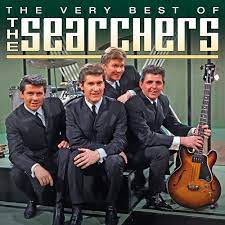
When You Walk in the Room is a famous song by The Searchers, originally written by Jackie DeShannon in 1963. The Searchers' version, released in 1964, became a big hit.
It's a happy, upbeat song about how someone special can light up a room. The song did very well on music charts, reaching number three in the UK and number 35 in the US.
The Searchers were known more for their hit singles than full albums, but they did release several albums in the early 1960s.
While "When You Walk in the Room" wasn't on their original albums, it's often included in collections of their best songs because so many people love it.
Played in standard tuning with just a few riffs, use a down down up down up down up and repeat rhythm pattern with a few down-strokes leading into the verses. The chords you'll need are G, C, Em, G6, D, Em, A7 and a D/Gb.
Jump To Top Of Popular Bands In The 60s
The Steam Machine Songs
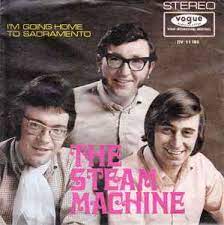
Let The Feeling Begin is a song by The Steam Machine but it's difficult to find any info on this song.
I'm not sure but this may be a song from 1971 and the band may be based out of Germany. I'll leave it here for the time being.
For rhythm here a down down down up down up and repeat pattern will work in standard tuning and a capo 2nd fret to keep the original key. There is some lead while playing the chords D, G, Em, A7, Fm, A#, D# and G#.
Jump To Top
The Tokens Songs
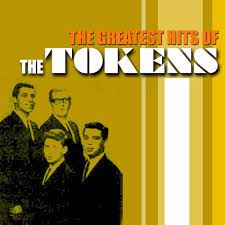
The Lion Sleeps Tonight is a song from the band The Tokens. They were an American doo-wop group that gained fame in the 1960s. They are best known for their hit single "The Lion Sleeps Tonight," which reached No. 1 on the Billboard Hot 100 chart in 1961.
The song is a reworking of a South African Zulu song titled "Mbube" by Solomon Linda.
This one has a capoed 2nd fret with Drop D Tuning but only three chords which are D, G and A. There are a few riffs in this one while playing the rhythm down up down up and some muted shuffles.
Jump To Top Of Popular Bands In The 60s
The Turtles Songs
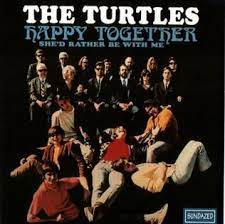
Happy Together was released as a single by The Turtles back in 1967 and reached #1 in the US market although they did have a few top 10 hits.
This one hails from the album "Happy Together".
I'm playing this one with a capo on the 4th fret in standard tuning and no lead work here. The chords are Dm, C, A#, A, Am7 and F using a down up down up and repeat rhythm pattern with some shuffle strumming.
Jump To Top
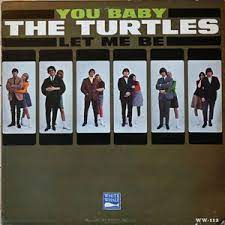
You Baby is a song by The Turtles that was released in 1966. It was written by P.F. Sloan and Steve Barri, who were renowned songwriters and producers during the 1960s. The song became one of The Turtles' notable hits, reaching number 20 on the Billboard Hot 100 chart.
The Turtles' rendition
of "You Baby" became a radio favorite and contributed to their growing
popularity during the mid-1960s.
It's worth noting that "You Baby" has also been recorded by other artists, including The Lovin' Spoonful and Cher, further showcasing its appeal and versatility as a well-loved song from the era.
This one is played with a steady up and down rhythm pattern and one spot where you'll play all down strokes. It's a capo 4th if you can sing that high but I'm om the 2nd fret in standard tuning play the chords G, Bm, C, D, Am7 and a G6. A few riffs only in this one.
Jump To Top Of Popular Bands In The 60s
The Vogues - You're The One
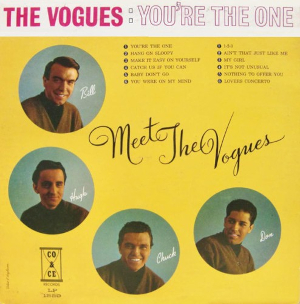
You're The One was a song co-written by Petula Clark and Tony Hatch back in 1965 but they decided not to record a version themselves. The song made it's way to The Vogues who recorded it that same year and scored a #4 hit in the US and a #55 in Australia with the song.
Jump To Top
The Walker Brothers Songs
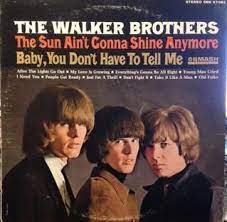
The Sun Ain't Gonna Shine Anymore was recorded by Frankie Valli and written by Bob Crewe and Bob Gaudio back in 1965, but the Walker Brothers had more success with their version in 1966 reaching #1 in the UK.
The song was also a top 10 in several countries and a #13 in the USA.
Just a few riff in here in standard tuning playing a down down up down down up and repeat rhythm pattern and some down strokes. The chords are D, Em, A, G and A7.
Jump To Top Of Popular Bands In The 60s
The Wonders Songs
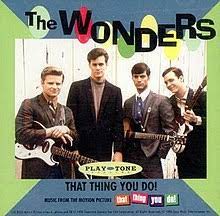
That Thing You Do, is a song by The Wonders, a fictional band from the 1996 film "That Thing You Do!" written and directed by Tom Hanks. The movie is about a one-hit wonder band from Erie, Pennsylvania, in the 1960s.
The
song was written by Adam Schlesinger and recorded by the real band
Fountains of Wayne. Although The Wonders are not a real band, their
story and music pay tribute to 1960s pop rock and the experiences of
real bands from that era.
This one is in Drop D Tuning and a capo 2nd fret with the chords D, G, A, Bm, G7, C, A7, D7, Gm, A/A#, A7sus and A#. Several rhythm patterns including and down up down up while playing a walking bass, some down strokes and chops throughout. Some lead work in this one.
Jump To Top
The Yardbirds Songs
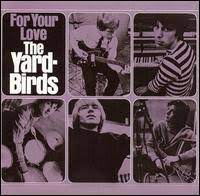
For Your Love was a departure from the blues sound of this band when they recorded and released this song in 1965. It became a top 10 in both the UK and the US. But in spite of that, guitarist Eric Clapton left the band because the band took this direction.
The song is from their 1965 studio album of the same name.
The rhythm pattern here is a down up down up down up down up and repeat pattern in standard tuning. No lead to worry about playing the chords Em, G, A, Am, B, E and Dbm.
Jump To Top
The Youngbloods Songs
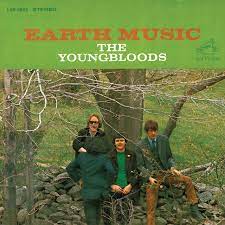
The Wine Song was never released as a single by the group.
It can be found on their 1967 album "Earth Music".
The chords for this one are G7, G, C, C7, F, E7, A7, D7 and B7 in standard tuning and no lead work. For rhythm play a root down root up down up and repeat pattern.
Jump To Top Of Popular Bands In The 60s
The Young Rascals Songs
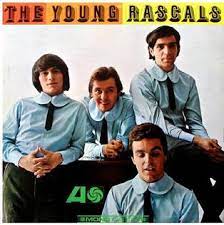
Good Lovin was a single release by The Young Rascals in 1966. The song had been recorded twice before the Rascals did their version.
The song hit #1 in the US in the spring of 1966 and can be found on their album "The Young Rascals".
Only
four chords here and they are D, G, A and E in standard tuning. A few
riffs and a little lead work while playing a steady down up down up down
up rhythm pattern.
Jump To Top
The Zombies Songs
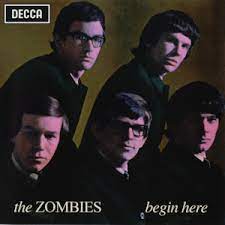
She's Not There was the first single in 1964 from The Zombies, a British rock band. It's a song that would become very famous.
You can find this song on their first album called "Begin Here." The song was written by their keyboard player, Rod Argent.
"She's Not There" did really well on the music charts. In the United States, it climbed all the way to the second position on the Billboard Hot 100, which is quite high!
In the United Kingdom, it reached the 12th spot on the UK Singles Chart. This means a lot of people were listening to this song and liked it very much.
You can play this one in standard tuning with a down down up down up down up and repeat rhythm pattern and no lead. The chords here are Am7, A, Am, D, Dm, E7 and a C.
Free Lesson + Demo at 7:46
Jump To Top Of Popular Bands In The 60s

Tell Her No is a song that was released in the same era, during the 1960s, when The Zombies making a name for themselves in the music world. "Tell Her No" was one of their most well-known songs.
Just like "She's Not There," "Tell Her No" also did really well on the music charts. In the United States, it reached the 6th position on the Billboard Hot 100, which is a great achievement for a band. It was a catchy tune that a lot of people enjoyed listening to.
This song was written by Rod Argent, the same member who wrote "She's Not There." He was the band's keyboard player and a talented songwriter.
"Tell Her No" left a lasting legacy. It's considered one of the classics from the 1960s. Over the years, different artists and bands have covered this song because it's such a great tune.
This one has a down down up up down up - down down up up down up and repeat rhythm pattern with a few chops here and there. Played in standard tuning, there is no lead here while you play through the chords Em7/A, Dmaj7, E7, A6, Bm, D, Em and a G6.
Jump To Top

Time Of The Season also had a lot of success on the music charts. In the United States, it became a massive hit, reaching the 3rd position on the Billboard Hot 100. This showed how much people loved this song and the band's music.
The track was written by Rod Argent, the talented keyboard player of The Zombies. He was not only good at playing the keyboard but also at creating wonderful songs
"Time of the Season" is not just a song from the past; it's a timeless piece of music that has left a lasting mark on the world of rock and pop.
For chords here you'll play an Em, C, G, G6 and Am7 in standard tuning but some lead is required here. Play a down down up down down up down up rhythm pattern but this one has a riff with a quick shuffle as well.
Jump To Top Of Popular Bands In The 60s
We Five Songs
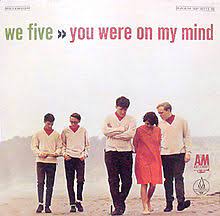
You Were On My Mind was a folk song originally by Canadian artists Ian and Sylvia Tyson. We Five turned it into a pop hit in 1965, scoring a #1 on the US charts.
The track can be found on the album of the same name.
I use a capo 2nd fret on this number in standard tuning and no lead required. Play all down stroke for rhythm with the chords D, G, A, Em, Gbm, Gb, B7, E, Abm, Gbm and an Ab.
Jump To Top
Zagar & Evans Songs
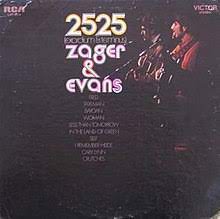
In The Year 2525 was released by Zager and Evans, who were a duo in the 1960's.
This #1 song in 1969 in both the US and the UK. It was released five years earlier but didn't do much on the charts until the duo got on the RCA label.
This song does half steps climbs so you'll start with the chords Abm, Gb, E, Eb and then change key to include the chords Am, G, F, E, A#m, G#, Gb and an F. You can play a down down up down down up pattern and repeat in standard tuning and some shuffle strumming near the end.
Jump To Top Of Popular Bands In The 60s
Thank you for visiting my popular bands in the 60s page and I hope you found some useful and helpful info here.
If you liked this Popular Bands In The 60s page you might also like ... (click images)
Popular Songs From The 60s
